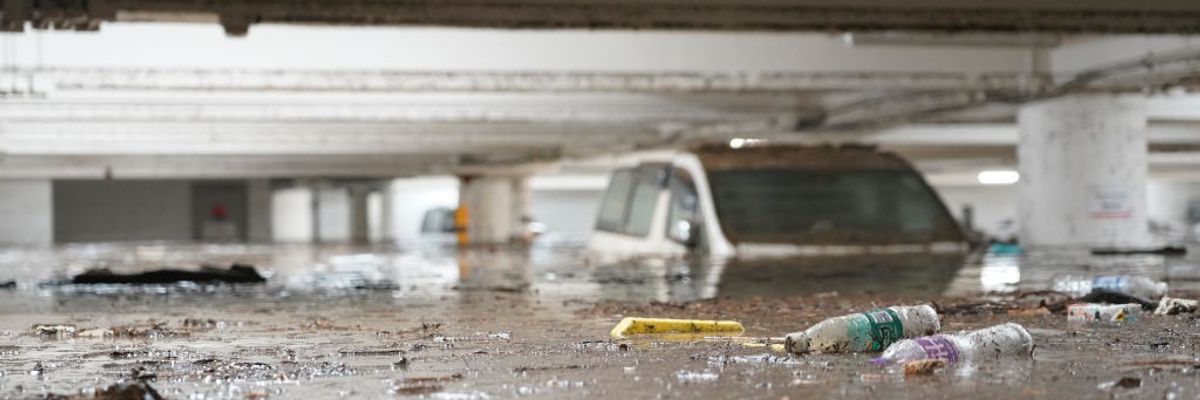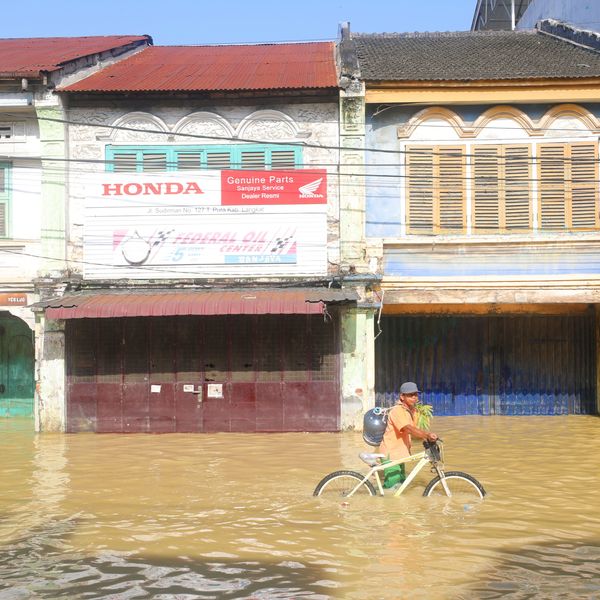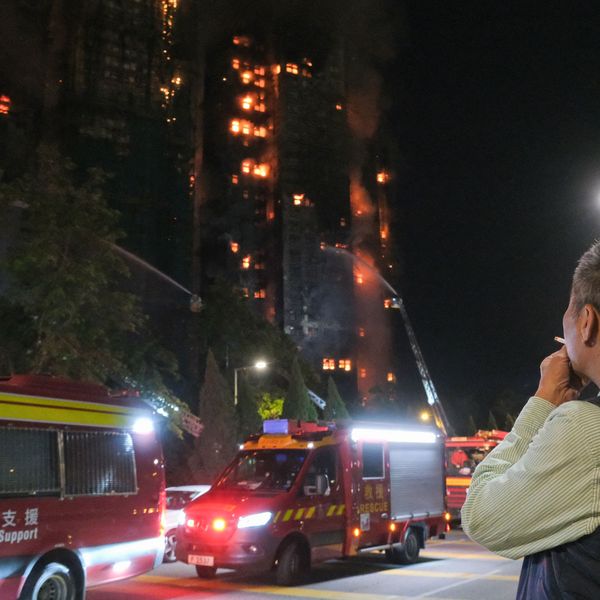
Wan Tsui parking lot is flooded on September 8, 2023, in Hong Kong, China as torrential downpours hit Hong Kong on the night of September 7 and caused widespread flooding.
'Terrifying': Hong Kong's Heaviest Rainfall on Record Brings Deadly Flooding
Between 11 pm Thursday and midnight Friday local time, the Hong Kong Observatory recorded more than 6.2 inches of rain, the most rain in an hour since 1884.
The heaviest rainfall in 140 years brought deadly flooding to Hong Kong Friday.
The deluge killed two, injured more than 140, flooded streets and tunnels, and shuttered schools and the stock market.
"I've never seen scenes like this before. Even during previous typhoons, it was never this severe," Connie Cheung, a 65-year-old assistant nurse, told Reuters. "It's quite terrifying."
Between 11 pm Thursday and midnight Friday local time, the Hong Kong Observatory recorded more than 6.2 inches of rain, according to CNN. That's the most rain in an hour since 1884, when record-keeping started. The deluge prompted the weather agency to announce a "black" rainstorm warning—the highest possible.
"Hong Kong is experiencing a once-in-a-century torrential rainstorm, and 'extreme conditions' have made the situation serious in many districts," chief executive John Lee wrote on Facebook during the storm.
The rain came from once-typhoon Haikui, which made landfall in Fujian, China, Tuesday, Reuters reported. While it has since weakened to a tropical depression, it continues to dump rain while moving slowly. The climate crisis, caused mostly by the burning of fossil fuels, is making tropical storms more extreme, as Al Jazeera noted. At the same time, a warmer atmosphere holds more moisture—at a rate of 7% per 1.8°F of warming. The Hong Kong deluge comes days after Greece experienced its wettest 24-hours on record, as one official said.
"This is fast becoming the new normal," the activist group Climate Defiance wrote on the site formerly known as Twitter. "How is this normal? How can this go on?"
The storm killed at least two people, whom police found floating in flood waters, as The Associated Press reported. The fire department helped 110 people evacuate.
Rain flooded streets and subway stations, stranding commuters including professor Stuart Hargreaves, who told CNN he had to sleep in his car after the roads became "impassible."
"Water was coming over the hood of the car and I thought it was going to flood the engine," he said.
Hargreaves found a safe place to park for the night, and said when he drove home the streets were full of debris from flooding and landslides. Schools were closed Friday "due to extreme conditions," and authorities also urged workers not to go into the office, as Al Jazeera reported.
"I have instructed all government departments to race against time, concentrate firepower on the aftermath work, and repair the affected roads and community facilities as soon as possible."
The remnants of Haikui also brought extreme rainfall to southern China, where Shenzhen recorded a record 18.4 inches of rain, and more than 11,000 were evacuated from Meizhou in Guangdong province, as AP reported. In Shenzhen, schools were also closed, as well as some offices and subway stations, according to Reuters. Schools were closed or delayed in 10 Guangdong districts. Beijing also warned several of its neighborhoods to prepare for heavy flooding through Saturday, AP said.
In Hong Kong, the government began recovery efforts.
"I have instructed all government departments to race against time, concentrate firepower on the aftermath work, and repair the affected roads and community facilities as soon as possible," Lee wrote on Facebook.
However, some residents of Hong Kong expressed concerns online that the territory had not been prepared for the inundation, and Greenpeace East Asia raised questions about the city's ability to adapt to the climate crisis, noting that the storm overflowed the city's drainage system and that the city did not take advantage of its emergency alert systems.
"Greenpeace Hong Kong urges the government to study the impacts of climate change, identify high-risk areas, create long-term response strategies, improve emergency response capabilities, and propel the development of renewable energy and energy conservation measures," the group wrote on social media.
An Urgent Message From Our Co-Founder
Dear Common Dreams reader, The U.S. is on a fast track to authoritarianism like nothing I've ever seen. Meanwhile, corporate news outlets are utterly capitulating to Trump, twisting their coverage to avoid drawing his ire while lining up to stuff cash in his pockets. That's why I believe that Common Dreams is doing the best and most consequential reporting that we've ever done. Our small but mighty team is a progressive reporting powerhouse, covering the news every day that the corporate media never will. Our mission has always been simple: To inform. To inspire. And to ignite change for the common good. Now here's the key piece that I want all our readers to understand: None of this would be possible without your financial support. That's not just some fundraising cliche. It's the absolute and literal truth. We don't accept corporate advertising and never will. We don't have a paywall because we don't think people should be blocked from critical news based on their ability to pay. Everything we do is funded by the donations of readers like you. Will you donate now to help power the nonprofit, independent reporting of Common Dreams? Thank you for being a vital member of our community. Together, we can keep independent journalism alive when it’s needed most. - Craig Brown, Co-founder |
The heaviest rainfall in 140 years brought deadly flooding to Hong Kong Friday.
The deluge killed two, injured more than 140, flooded streets and tunnels, and shuttered schools and the stock market.
"I've never seen scenes like this before. Even during previous typhoons, it was never this severe," Connie Cheung, a 65-year-old assistant nurse, told Reuters. "It's quite terrifying."
Between 11 pm Thursday and midnight Friday local time, the Hong Kong Observatory recorded more than 6.2 inches of rain, according to CNN. That's the most rain in an hour since 1884, when record-keeping started. The deluge prompted the weather agency to announce a "black" rainstorm warning—the highest possible.
"Hong Kong is experiencing a once-in-a-century torrential rainstorm, and 'extreme conditions' have made the situation serious in many districts," chief executive John Lee wrote on Facebook during the storm.
The rain came from once-typhoon Haikui, which made landfall in Fujian, China, Tuesday, Reuters reported. While it has since weakened to a tropical depression, it continues to dump rain while moving slowly. The climate crisis, caused mostly by the burning of fossil fuels, is making tropical storms more extreme, as Al Jazeera noted. At the same time, a warmer atmosphere holds more moisture—at a rate of 7% per 1.8°F of warming. The Hong Kong deluge comes days after Greece experienced its wettest 24-hours on record, as one official said.
"This is fast becoming the new normal," the activist group Climate Defiance wrote on the site formerly known as Twitter. "How is this normal? How can this go on?"
The storm killed at least two people, whom police found floating in flood waters, as The Associated Press reported. The fire department helped 110 people evacuate.
Rain flooded streets and subway stations, stranding commuters including professor Stuart Hargreaves, who told CNN he had to sleep in his car after the roads became "impassible."
"Water was coming over the hood of the car and I thought it was going to flood the engine," he said.
Hargreaves found a safe place to park for the night, and said when he drove home the streets were full of debris from flooding and landslides. Schools were closed Friday "due to extreme conditions," and authorities also urged workers not to go into the office, as Al Jazeera reported.
"I have instructed all government departments to race against time, concentrate firepower on the aftermath work, and repair the affected roads and community facilities as soon as possible."
The remnants of Haikui also brought extreme rainfall to southern China, where Shenzhen recorded a record 18.4 inches of rain, and more than 11,000 were evacuated from Meizhou in Guangdong province, as AP reported. In Shenzhen, schools were also closed, as well as some offices and subway stations, according to Reuters. Schools were closed or delayed in 10 Guangdong districts. Beijing also warned several of its neighborhoods to prepare for heavy flooding through Saturday, AP said.
In Hong Kong, the government began recovery efforts.
"I have instructed all government departments to race against time, concentrate firepower on the aftermath work, and repair the affected roads and community facilities as soon as possible," Lee wrote on Facebook.
However, some residents of Hong Kong expressed concerns online that the territory had not been prepared for the inundation, and Greenpeace East Asia raised questions about the city's ability to adapt to the climate crisis, noting that the storm overflowed the city's drainage system and that the city did not take advantage of its emergency alert systems.
"Greenpeace Hong Kong urges the government to study the impacts of climate change, identify high-risk areas, create long-term response strategies, improve emergency response capabilities, and propel the development of renewable energy and energy conservation measures," the group wrote on social media.
- 'What Happens When You Warm a Planet': Massive Flooding Kills At Least 8 in Seoul ›
- In China, 'Heaviest Rain in 1,000 Years' Triggers Deadly Flooding, Landslides ›
- 'Absolutely Gobsmackingly Bananas': Early Data Shows September 2023 Hottest on Record ›
- Criminal Probe Underway as Hong Kong Tower Fire Leaves Dozens Dead and Hundreds Missing | Common Dreams ›
The heaviest rainfall in 140 years brought deadly flooding to Hong Kong Friday.
The deluge killed two, injured more than 140, flooded streets and tunnels, and shuttered schools and the stock market.
"I've never seen scenes like this before. Even during previous typhoons, it was never this severe," Connie Cheung, a 65-year-old assistant nurse, told Reuters. "It's quite terrifying."
Between 11 pm Thursday and midnight Friday local time, the Hong Kong Observatory recorded more than 6.2 inches of rain, according to CNN. That's the most rain in an hour since 1884, when record-keeping started. The deluge prompted the weather agency to announce a "black" rainstorm warning—the highest possible.
"Hong Kong is experiencing a once-in-a-century torrential rainstorm, and 'extreme conditions' have made the situation serious in many districts," chief executive John Lee wrote on Facebook during the storm.
The rain came from once-typhoon Haikui, which made landfall in Fujian, China, Tuesday, Reuters reported. While it has since weakened to a tropical depression, it continues to dump rain while moving slowly. The climate crisis, caused mostly by the burning of fossil fuels, is making tropical storms more extreme, as Al Jazeera noted. At the same time, a warmer atmosphere holds more moisture—at a rate of 7% per 1.8°F of warming. The Hong Kong deluge comes days after Greece experienced its wettest 24-hours on record, as one official said.
"This is fast becoming the new normal," the activist group Climate Defiance wrote on the site formerly known as Twitter. "How is this normal? How can this go on?"
The storm killed at least two people, whom police found floating in flood waters, as The Associated Press reported. The fire department helped 110 people evacuate.
Rain flooded streets and subway stations, stranding commuters including professor Stuart Hargreaves, who told CNN he had to sleep in his car after the roads became "impassible."
"Water was coming over the hood of the car and I thought it was going to flood the engine," he said.
Hargreaves found a safe place to park for the night, and said when he drove home the streets were full of debris from flooding and landslides. Schools were closed Friday "due to extreme conditions," and authorities also urged workers not to go into the office, as Al Jazeera reported.
"I have instructed all government departments to race against time, concentrate firepower on the aftermath work, and repair the affected roads and community facilities as soon as possible."
The remnants of Haikui also brought extreme rainfall to southern China, where Shenzhen recorded a record 18.4 inches of rain, and more than 11,000 were evacuated from Meizhou in Guangdong province, as AP reported. In Shenzhen, schools were also closed, as well as some offices and subway stations, according to Reuters. Schools were closed or delayed in 10 Guangdong districts. Beijing also warned several of its neighborhoods to prepare for heavy flooding through Saturday, AP said.
In Hong Kong, the government began recovery efforts.
"I have instructed all government departments to race against time, concentrate firepower on the aftermath work, and repair the affected roads and community facilities as soon as possible," Lee wrote on Facebook.
However, some residents of Hong Kong expressed concerns online that the territory had not been prepared for the inundation, and Greenpeace East Asia raised questions about the city's ability to adapt to the climate crisis, noting that the storm overflowed the city's drainage system and that the city did not take advantage of its emergency alert systems.
"Greenpeace Hong Kong urges the government to study the impacts of climate change, identify high-risk areas, create long-term response strategies, improve emergency response capabilities, and propel the development of renewable energy and energy conservation measures," the group wrote on social media.
- 'What Happens When You Warm a Planet': Massive Flooding Kills At Least 8 in Seoul ›
- In China, 'Heaviest Rain in 1,000 Years' Triggers Deadly Flooding, Landslides ›
- 'Absolutely Gobsmackingly Bananas': Early Data Shows September 2023 Hottest on Record ›
- Criminal Probe Underway as Hong Kong Tower Fire Leaves Dozens Dead and Hundreds Missing | Common Dreams ›

